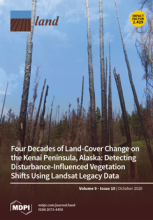Land Library
Bienvenue dans la bibliothèque du Land Portal. Explorez notre vaste collection de ressources en libre accès (plus de 74 000), comprenant des rapports, des articles scientifiques, des articles de recherche, des publications évaluées par des pairs, des documents juridiques, des vidéos et bien plus encore.
/ library resources
Showing items 1 through 9 of 15.Although land forms the basis for marginal livelihoods in Sub-Saharan Africa, the asset is more strategic for women as they usually hold derived and dependent rights to land in customary tenure areas.
Inequalities in land rights exist globally, both in formal and customary settings. This is because land rights are either strong or weak, and held by various categories of people.
Typically, peri-urban areas are havens and vulnerable receptors of customary land rights (CLRs) disputes due to the intrusion of urban activities or an uncoordinated mix of both.
The 1995 Constitution of the Republic of Uganda is one of the most gender sensitive constitutions in the world, with clear provisions for promoting and protecting the rights of women.
Well before the effective ending of the protracted Lord’s Resistance Army (LRA)
insurgency in northern Uganda in July 2006, and at a time when the entire rural
population was displaced into camps, concerns had emerged around land, in particular
The Karamoja region in Northeastern Uganda, covering an area of 27,200 square kilometers, is inhabited by around 1.2 million people who live in seven districts; Moroto, Nakapiripirit, Napak, Amudat, Abim, Kotido and Kaabong.
Unfolding analysis reveals two types of land disputes prevalent in postwar northern Uganda: cases that involve a legitimate cause of action and those that do not.1 Since mediation and alternative forms of dispute resolution rely on parties’ willingness to negotiate in good faith, cases featuring
Conflict associated with land has increased substantially following the return of peace to the Acholi Region with the return of internally displaced people (IDP), population growth, and increases in the value of land.
Post-conflict northern Uganda has witnessed an increase in disputes over land. This has, to a great extent, been as a result of the armed conflict and its aftermath.








